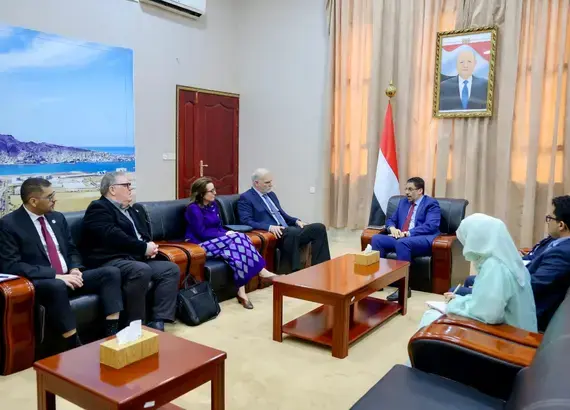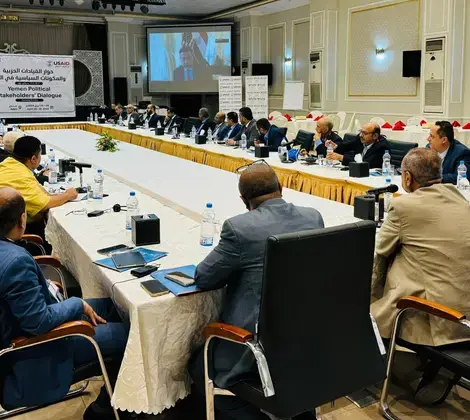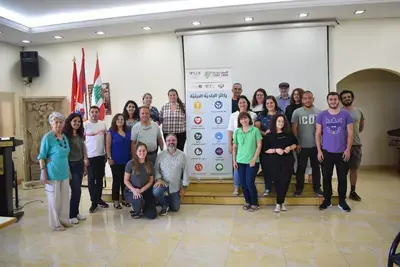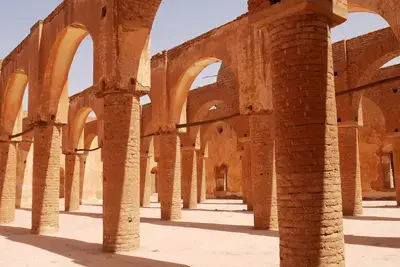
NDI Senior Associate and MENA Regional Director, Les Campbell , Senior Country Director, Kenza Aqertit, and Conflict Resolution expert Jeffrey Fox, meet with H.E. Ahmad Awad bin Mubarak, Yemen's Prime Minister in Aden, April 27, 2024.
Success Story
Yemen’s Political Leaders Forge New Pro-Peace Coalition
Since 2014, Yemen has been enmeshed in an armed conflict between Yemen’s government, the Houthi rebel group, and the international actors that support both sides, which has killed nearly 400,000 Yemenis and left nearly two-thirds of the country in need of humanitarian assistance. Many of Yemen’s political leaders who are supportive of the country’s internationally recognized government have been forced to flee the country since the Houthis seized control of Sanaa, Yemen’s capital. Separated through the conflict and with some living in exile, politicians aligned with Yemen’s internationally recognized government have had few opportunities to gather to discuss the day-to-day issues facing the people they serve.
The Yemeni government is now preparing for the commencement of a long awaited “Yemeni-Yemeni” dialogue with the Houthis to end the protracted conflict and agree to new political arrangements after a decade of violence and instability. Ahead of these potential talks, leading political parties and movements supportive of the legitimate government recognize the urgency of resolving their political differences and identifying key policies that must be addressed to help reach a political settlement.
In April 2024, twenty-four representatives of leading political parties and movements supportive of Yemen’s government convened in Aden, Yemen’s temporary capital, for a two-day meeting with the goals of building consensus and charting a path forward for their country. This multi-party dialogue was the first gathering of Yemen’s leading political entities to take place in the country since the start of the war.
During the dialogue session facilitated and supported by the National Democratic Institute (NDI) and the United States Agency for International Development (USAID) through the Consortium for Elections and Political Process Strengthening (CEPPS), party and movement representatives discussed their key political priorities, as well as the most significant impediments to peace in Yemen. Speaking to the press, one participant in the dialogue praised the inclusive nature of what is becoming known as the “National Political Alliance” and noted its role in helping “restore political life after the leaders left the country and lived as disintegrated islands distributed among the countries of the Arab world.”

The participants in the dialogue began with differing opinions on what the country’s most pressing priorities were and how to address them, including how to resolve the Southern issue. However, all parties agreed on the importance of leaving the dialogue with a unified statement of intent they could share with the public to demonstrate their commitment to resolving the conflict. After the dialogue, one participant observed that discussions such as this “are extremely important to reactivate political work by the political parties and components after a period of inactivity.”
At the conclusion of the dialogue, NDI worked with representatives of all 24 parties and groups to identify seven key priorities, which they hope to work collaboratively within a “National Political Alliance” platform. They agreed on addressing the grievances and demands of the people of southern Yemen as a key to a lasting political settlement, ending the Houthi coup by returning Yemen’s governing institutions to the control of the internationally recognized government, providing reliable government services to the Yemeni people, and countering corruption and terrorism. The agreement represents a significant step toward building consensus among the leading parties of Yemen and will help revitalize the political forces that support Yemen’s internationally recognized government, allowing them to more effectively participate in future peace talks. While the path to achieving political consensus and unity in Yemen is filled with several potential hurdles, the commitment shown by these leaders to set aside differences to address Yemen’s most pressing challenges is cause for optimism.
The political dialogue and consensus also serve as an important signal to the international community of the Yemeni commitment to a peaceful way forward. As one participant said following the dialogue, the stakes of failing to end the war are high, and the importance of establishing a peaceful, functional, unified state in Yemen represents “the greatest motivation for the success of this coalition.” As leaders embark on the long and trying process of rebuilding the war-torn country, the international community can work with Yemeni leaders who are well-equipped and motivated to negotiate peace and set Yemen on the path toward sustainable governance.
Despite the continuing conflict and humanitarian crisis, the Yemeni people and international community have expressed enthusiasm for the dialogue and planned National Political Alliance. Leading publications and news media in Yemen covered these developments and the national conversation around them for eight days in a row following the conference. NDI Senior Associate and Regional Director for the Middle East and North Africa, Les Campbell, who attended the event, shared his optimism for a better future for the Yemeni people following the dialogue. “Working with partners in Yemen who are committed to engaging in the work of developing political consensus gives us hope that Yemeni leaders can break the cycle of violence plaguing their people and build a sustainable peace,” Campbell said. “This historic dialogue and political agreement will inject new energy into Yemen’s political life, revitalize political parties, movements and entities and represents an important step in resolving a decade-long conflict that has brought instability, upheaval, and tragedy to millions of Yemeni people.”
NDI's engagement with this program is implemented with support from the United States Agency for International Development (USAID) through the Consortium for Elections and Political Process Strengthening (CEPPS).


